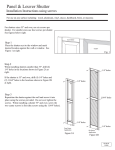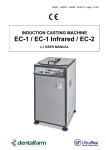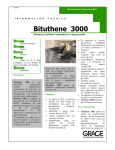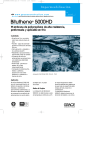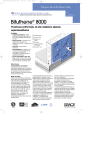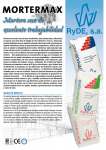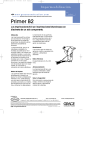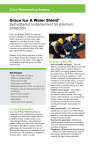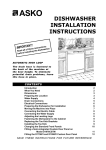Download Grace 5003004 Instructions / Assembly
Transcript
Grace Above Grade Waterproofing BITUTHENE SYSTEM 4000 ® Self-adhesive HDPE waterproofing membrane with super tacky compound for use with patented, water-based System 4000 Surface Conditioner Description Bituthene® System 4000 is a 1⁄16 in. (1.5 mm) flexible, pre-formed waterproof membrane which combines a high performance, cross laminated, HDPE carrier film with a unique, super tacky, self-adhesive rubberized asphalt compound. System 4000 Surface Conditioner is a unique, water-based, latex surface treatment which imparts an aggressive, high tack finish to the treated substrate. It is specifically formulated to bind site dust and concrete efflorescence, thereby providing a suitable surface for the Bituthene System 4000 Waterproofing Membrane. Conveniently packaged in each roll of membrane, System 4000 Surface Conditioner promotes good initial adhesion and, more importantly, excellent permanent adhesion of the Bituthene System 4000 Waterproofing Membrane. The VOC (Volatile Organic Compound) content of this product is 91 g/L. Product Advantages • Excellent adhesion Architectural and Industrial Maintenance Regulations limit the VOC content in products classified as Architectural Coatings. Refer to Technical Letters at www.graceconstruction.com for most current list of allowable limits. Advantages • Excellent adhesion—special adhesive compound engineered to work with high tack System 4000 Surface Conditioner • Cold applied—simple application to substrates, especially at low temperatures • Reduced inventory and handling costs— System 4000 Surface Conditioner is included with each roll of membrane • Wide application temperature range— excellent bond to self and substrate from 25°F (-4°C) and above • Overlap security—minimizes margin for error under site conditions • Cross laminated, high density polyethylene carrier film—provides high tear strength, puncture and impact resistance Bituthene Liquid Membrane or Bituthene Mastic Bituthene Liquid Membrane • Cold applied • Reduced inventory and handling costs • Wide application temperature range • Overlap security • Cross laminated, high density polyethylene carrier film • Flexible • UL approval Class A Fire Rating • Ripcord Bituthene 4000 System 4000 Surface Conditioner Hydroduct 660 Drawings are for illustration purposes only. Please refer to www.graceconstruction.com for specific application details. • Flexible—accommodates minor structural movements and will bridge shrinkage cracks • UL approval Class A Fire Rating—see approvals section inside for details • Ripcord®—this Split Release on Demand feature allows the splitting of the membrane into two (2) pieces for ease of installation in detailed areas Use Bituthene is ideal for waterproofing concrete decks where in-service temperatures will not exceed 130°F (54°C). It can be applied to split slab construction such as in plaza areas and parking decks. Interior uses may include mechanical rooms, laboratories, kitchens and bathrooms. (For below grade applications, see “Below Grade Waterproofing Bituthene System 4000.”) Bituthene is 1⁄16 in. (1.5 mm) thick, 3 ft (0.9 m) wide and 66.7 ft (20 m) long and is supplied in rolls. It is unrolled adhesive side down onto concrete slabs primed with System 4000 Surface Conditioner. Continuity is achieved by overlapping a minimum 2 in. (50 mm) and firmly rolling the joint. Bituthene is extremely flexible. It is capable of bridging shrinkage cracks in the concrete and will accommodate minor differential movement throughout the service life of the structure. Application Procedures Safety, Storage and Handling Information Bituthene products must be handled properly. Vapors from solvent-based primers and mastic are harmful and flammable. For these products, the best available information on safe handling, storage, personal protection, health and environmental considerations has been gathered. Material Safety Data Sheets (MSDS) are available at www.graceconstruction.com and users should acquaint themselves with this information. Carefully read detailed precaution statements on product labels and the MSDS before use. Surface Preparation Surfaces should be structurally sound and free of voids, spalled areas, loose aggregate and sharp protrusions. Remove contaminants such as grease, oil and wax from exposed surfaces. Remove dust, dirt, loose stone and debris. Concrete must be properly dried (minimum 7 days for normal structural concrete and 14 days for lightweight structural concrete). If time is critical, Bituthene Primer B2 or Bituthene Primer B2 LVC may be used to allow priming and installation of membrane on damp surfaces or green concrete. Priming may begin in this case as soon as the concrete will maintain structural integrity. Use form release agents which will not transfer to the concrete. Remove forms as soon as possible from below horizontal slabs to prevent entrapment of excess moisture. Excess moisture may lead to blistering of the membrane. Cure concrete with clear, resin-based curing compounds which do not contain oil, wax or pigment. Except with Bituthene Primer B2 or Bituthene Primer B2 LVC, allow concrete to thoroughly dry following rain. Do not apply any products to frozen concrete. Repair defects such as spalled or poorly consolidated areas. Remove sharp protrusions and form match lines. For rough or uneven surfaces use Bituthene Deck Prep® as a repair and leveling agent. See “Bituthene Deck Prep” product information sheet for details. On masonry surfaces, apply a parge coat to rough concrete block and brick walls or trowel cut mortar joints flush to the face of the concrete blocks. Temperature • Apply Bituthene System 4000 Membrane and Conditioner only in dry weather and when air and surface temperatures are 25°F (-4°C) or above. • Apply Bituthene Primer B2 in dry weather above 25°F (-4°C). (See separate product information sheet.) Conditioning Bituthene System 4000 Surface Conditioner is ready to use and can be applied by spray or roller. For best results, use a pump-type air sprayer with fan tip nozzle, like the Bituthene System 4000 Surface Conditioner Sprayer, to apply the surface conditioner. Apply Bituthene System 4000 Surface Conditioner to clean, dry, frost-free surfaces at a coverage rate of 300 ft2/gal (7.4 m2/L). Coverage should be uniform. Surface conditioner should not be applied so heavily that it puddles or runs. Do not apply conditioner to Bituthene membrane. Allow Bituthene System 4000 Surface Conditioner to dry one hour or until substrate returns to its original color. At low temperatures or in high humidity conditions, dry time may be longer. System 4000 Surface Conditioner Sprayer The Bituthene System 4000 Surface Conditioner Sprayer is a professional grade, polyethylene, pump-type, compressed air sprayer with a brass fan tip nozzle. It has a 2 gal (7.6 L) capacity. The nozzle orifice and spray pattern have been specifically engineered for the optimum application of Bituthene System 4000 Surface Conditioner. Hold nozzle 18 in. (450 mm) from substrate and squeeze handle to spray. Spray in a sweeping motion until substrate is uniformly covered. Sprayer should be repressurized by pumping as needed. For best results, sprayer should be maintained at high pressure during spraying. To release pressure, invert the sprayer and spray until all compressed air is released. Maintenance The Bituthene System 4000 Surface Conditioner Sprayer should perform without trouble for an extended period if maintained properly. Bituthene System 4000 Surface Conditioner is clear when dry and may be slightly tacky. In general, conditioning should be limited to what can be covered within 24 hours. In situations where long dry times may prevail, substrates may be conditioned in advance. Substrates should be reconditioned if significant dirt or dust accumulates. Before surface conditioner dries, tools should be cleaned with water. After surface conditioner dries, tools should be cleaned with mineral spirits. Mineral spirits is a combustible liquid which should be used only in accordance with manufacturer’s recommendations. Do not use solvents to clean hands or skin. Corner Details The treatment of corners varies depending on the location of the corner. For detailed information on Bituthene Liquid Membrane, see separate product information sheet. • At plaza deck to wall inside corners— Option 1: Apply membrane on wall and deck to within 1 in. (25 mm) of corner. Treat the inside corner by installing a 3⁄4 in. (20 mm) fillet of Bituthene Liquid Membrane. Extend Bituthene Liquid Sprayer should not be used to store Bituthene System 4000 Surface Conditioner. The sprayer should be flushed with clean water immediately after spraying. For breaks in the spray operation of one hour or less, invert the sprayer and squeeze the spray handle until only air comes from the nozzle. This will avoid clogging. Should the sprayer need repairs or parts, call the maintenance telephone number on the sprayer tank (800-323-0620). Membrane at least 21⁄2 in. (65 mm) onto deck membrane, and 21⁄2 in. (65 mm) onto wall membrane. Terminate top of wall flashing with Bituthene Mastic, Bituthene Liquid Membrane or termination bar. Option 2: Apply membrane on deck to within 1 in. (25 mm) of corner. Treat the inside corner by installing a 3⁄4 in. (20 mm) fillet of Bituthene Liquid Membrane. Extend Bituthene Liquid Membrane at least 21⁄2 in. (65 mm) onto wall. Option 3: Apply membrane on deck to within 1 in. (25 mm) of corner. Treat the inside corner by installing a 3⁄4 in. (20 mm) fillet of Bituthene Liquid Membrane. Apply membrane flashing sheet on wall, over fillet and 6 in. (150 mm) onto deck membrane. Apply 1 in. (25 mm) wide troweling of Bituthene Mastic or Bituthene Liquid Membrane over all terminations and seams within 12 in. (300 mm) of corner. Terminate top of wall flashing with mastic, Bituthene Liquid Membrane or termination bar. Expansion Joints in Concrete Construction Bituthene membrane is not an expansion joint filler or sealant, but may be used as an expansion joint cover only in limited, special situations, as shown in Figures 1 and 2. To adequately waterproof an expansion joint requires the use of materials specifically designed to do that job. Bituthene waterproofing systems can, in most cases, be tied into expansion joint waterproofing and/or covering systems to provide full waterproofing protection on a project. Project designers and/or contractors should consult with expansion joint sealant and covering manufacturers for design and installation details. A partial listing of manufacturers is included in Technical Letter 11. Also, Section 05800 of Sweets, Expansion Control, and Section 07920, Sealant and Caulking, provide information on manufacturers and design possibilities. Designers should consider using gutters under critical expansion joints to provide a second line of defense against seal failure. Use of Bituthene Membrane as an Expansion Joint Cover Figures 1 and 2 illustrate the use of Bituthene membrane as an expansion joint cover. • In planters, reflecting pools and fountains, apply membrane on wall and deck to within 1 in. (25 mm) of corner. Treat the inside corner by installing a 3⁄4 in. (20 mm) fillet of Bituthene Liquid Membrane. Extend Bituthene Liquid Membrane at least 21⁄2 in. (65 mm) onto deck membrane, and 21⁄2 in. (65 mm) onto wall membrane. Terminate top of wall membrane with Bituthene Liquid Membrane or termination bar. • Wall to wall inside corner, apply 12 in. (300 mm) sheet membrane strip centered on corner. Press membrane tightly into corner to assure full contact. Cover the treated corner with a full sheet of membrane to ensure 2-ply coverage. • Outside corners, apply 12 in. (300 mm) sheet membrane strip centered on corner. Cover the treated corner with a full sheet of membrane to ensure 2-ply coverage. Use Bituthene Deck Prep Surface Treatment to smooth rough areas 9 in. (225 mm) Bituthene Strip* Bituthene Liquid Membrane or appropriate sealant Hydroduct 660 Drainage Composite or hardboard Bituthene Membrane Backer rod Figure 1 Passive Joint Cover Hydroduct 660 Drainage Composite or hardboard 9 in. (225 mm) inverted strip of Bituthene Membrane* Full width Bituthene Membrane 18 in. (450 mm) Bituthene Strip Apply Bituthene Membrane to edge of expansion joint Expansion joint system by other manufacturer * Footnote: For joint with expected movement of less than 1⁄2 in. (13 mm), a 6 in. (150 mm) inverted strip is acceptable. Figure 2 Active Movement Joint Joints Properly seal all joints with waterstop, joint filler and sealant as required. Bituthene membranes are not intended to function as the primary joint seal. Allow sealants to fully cure. Pre-strip all slab and wall cracks over 1⁄16 in. (1.5 mm) wide and all construction and control joints with 9 in. (230 mm) wide sheet membrane strip. Application on Horizontal Surfaces Apply membrane from the low point to the high point so that laps shed water. Overlap all seams at least 2 in. (50 mm). Stagger all end laps. Roll the entire membrane firmly and completely as soon as possible. Use a linoleum roller or standard water-filled garden roller less than 30 in. (760 mm) wide, weighing a minimum of 75 lbs (34 kg) when filled. Cover the face of the roller with a resilient material such as a 1⁄2 in. (13 mm) plastic foam or two wraps of indoor-outdoor carpet to allow the membrane to fully contact the primed substrate. Seal all T-joints and membrane terminations with Bituthene Liquid Membrane at the end of the day. Protrusions and Drains Apply membrane to within 1 in. (25 mm) of the base of the protrusion. Apply Bituthene Liquid Membrane 0.1 in. (2.5 mm) thick around protrusion. Bituthene Liquid Membrane should extend over the membrane a minimum of 21⁄2 in. (65 mm) and up the penetration to just below the finished height of the wearing course. Flood Testing Flood test all horizontal applications with a minimum 2 in. (51 mm) head of water for 24 hours. Mark any leaks and repair when the membrane is dry. Before flood testing, be sure the structure will withstand the dead load of the water. For well-sloped decks, segment the flood test to avoid deep water near drains. Conduct the flood test 24 hours after completing the application of Bituthene waterproofing system. Immediately after flood test is completed, and all necessary repairs made, install Hydroduct® 660 Drainage Composite to protect the Bituthene membrane from traffic and other trades. Membrane Repairs Patch tears and inadequately lapped seams with membrane. Clean membrane with a damp cloth and dry. Slit fishmouths and repair with a patch extending 6 in. (150 mm) in all directions from the slit and seal edges of the patch with Bituthene Liquid Membrane. Inspect the membrane thoroughly before covering and make any repairs. Drainage Hydroduct drainage composites are recommended for both active drainage and protection of the membrane. See Hydroduct product information sheets. Protection of Membrane Protect Bituthene membranes to avoid damage from other trades, construction materials or finishes. Place protection immediately in temperatures above 77°F (25°C) to avoid potential for blisters. • On horizontal applications, exposed to construction traffic, use Hydroduct 660 Drainage Composite. Adhere as necessary to membrane with Hydroduct Tape. Alternate methods of protection are to use 1⁄8 in. (3 mm) or 1⁄4 in. (6 mm) asphalt hardboard. In mud slab waterproofing, or other applications where positive drainage is not desired, and where reinforced concrete slabs are placed over the membrane, the use of 1⁄4 in. (6 mm) hardboard or 2 layers of 1⁄8 in. (3 mm) hardboard is recommended. • Cover any exposed Bituthene membranes with weather resistant flashing such as copper, aluminum or neoprene. Install protection the same day the membrane is applied or immediately after 24 hour flood testing. No waiting before backfill or application of wearing course is necessary. Insulation Always apply Bituthene membrane directly to primed or conditioned structural substrates. Insulation, if used, must be applied over the membrane. Do not apply Bituthene membranes over lightweight insulating concrete. Approvals • City of Los Angeles Research Report RR 24386 • U.S. Department of Housing and Urban Development (HUD) HUD Materials Release 628E • Bituthene System 4000 Membrane carries an Underwriters’ Laboratory Class A Fire Rating (Building Materials Directory, File #R7910) when used in either of the following constructions: —Limited to noncombustible decks at inclines not exceeding 1⁄4 in. (6 mm) to the horizontal 1 ft (0.3 m). One layer of Bituthene waterproofing membrane, followed by one layer of 1⁄8 in. (3 mm) protection board, encased in 2 in. (50 mm) minimum concrete monolithic pour. —Limited to noncombustible decks at inclines not exceeding 1⁄4 in. (6 mm) to the horizontal 1 ft (0.3 m). One layer of Bituthene waterproofing membrane, followed by one layer of DOW Styrofoam PD Insulation Board [2 in. (50 mm) thick]. This is covered with one layer of 2 ft x 2 ft x 2 in. (0.6 m x 0.6 m x 50 mm) concrete paver topping. Warranty Five year material warranties covering Bituthene and Hydroduct products are available upon request. Contact your Grace sales representative for details. Technical Services Support is provided by full time, technically trained Grace representatives and technical service personnel, backed by a central research and development staff. Supply Bituthene System 4000 Roll weight Palletization Storage System 4000 Surface Conditioner Ancillary Products Surface Conditioner Sprayer Bituthene Liquid Membrane Hydroduct Tape Bituthene Mastic Complementary Material Hydroduct Equipment by others: 3 ft x 66.7 ft roll (200 ft2) [0.9 m x 20 m (18.6 m2)] 83 lbs (38 kg) gross 25 rolls per pallet Store upright in dry conditions below 95°F (+35°C). 1 x 0.625 gal (2.3 L) bottle in each roll of System 4000 Membrane 2 gal (7.6 L) capacity professional grade sprayer with specially engineered nozzle 1.5 gal (5.7 L) pail/125 pails per pallet or 4 gal (15.1 L) pail/48 pails per pallet 1 in. x 200 ft (2.5 cm x 61.0 m) roll/6 rolls per carton Twelve 30 oz (0.9 L) tubes/carton or 5 gal (18.9 L) pail/36 pails per pallet See separate data sheets Soft broom, utility knife, brush or roller for priming Physical Properties for Bituthene 4000 Membrane Property Color Thickness Flexibility, 180° bend over 1 in. (25 mm) mandrel at -25°F (-32°C) Tensile strength, membrane, die C Tensile strength, film Elongation, ultimate failure of rubberized asphalt Crack cycling at -25°F (-32°C), 100 cycles Lap adhesion at minimum application temperature Peel strength Puncture resistance, membrane Resistance to hydrostatic head Permeance Water absorption Typical Value Dark gray-black 1⁄16 in. (1.5 mm) nominal Unaffected Test Method 325 lbs/in.2 (2240 kPa) minimum 5,000 lbs/in.2 (34.5 MPa) minimum 300% minimum ASTM D412 modified1 ASTM D882 modified1 ASTM D412 modified1 Unaffected ASTM C836 5 lbs/in. (880 N/m) ASTM D1876 modified2 9 lbs/in. (1576 N/m) 50 lbs (222 N) minimum 210 ft (70 m) of water 0.05 perms (2.9 ng/m2sPa) maximum 0.1% maximum ASTM D903 modified3 ASTM E154 ASTM D5385 ASTM E96, section 12—water method ASTM D570 ASTM D3767—method A ASTM D1970 Footnotes: 1. The test is run at a rate of 2 in. (50 mm) per minute. 2. The test is conducted 15 minutes after the lap is formed and run at a rate of 2 in. (50 mm) per minute at 40°F (5°C). 3. The 180° peel strength is run at a rate of 12 in. (300 mm) per minute. Physical Properties for System 4000 Surface Conditioner Property Solvent type Flash point VOC* content Application temperature Freeze thaw stability Freezing point (as packaged) Dry time (hours) Typical Value Water >140°F (>60°C) 91 g/L 25°F (-4°C) and above 5 cycles (minimum) 14°F (-10°C) 1 hour** * Volatile Organic Compound ** Dry time will vary with weather conditions www.graceconstruction.com For technical assistance call toll free at 866-333-3SBM (3726) Bituthene, Bituthene Deck Prep, Hydroduct and Ripcord are registered trademarks of W. R. Grace & Co.–Conn. We hope the information here will be helpful. It is based on data and knowledge considered to be true and accurate and is offered for the users’ consideration, investigation and verification, but we do not warrant the results to be obtained. Please read all statements, recommendations or suggestions in conjunction with our conditions of sale, which apply to all goods supplied by us. No statement, recommendation or suggestion is intended for any use which would infringe any patent or copyright. W. R. Grace & Co.–Conn., 62 Whittemore Avenue, Cambridge, MA 02140. In Canada, Grace Canada, Inc., 294 Clements Road, West, Ajax, Ontario, Canada L1S 3C6. This product may be covered by patents or patents pending. BIT-250E Printed in U.S.A. 2/07 Copyright 2007. W. R. Grace & Co.–Conn. FA/LI/1M








